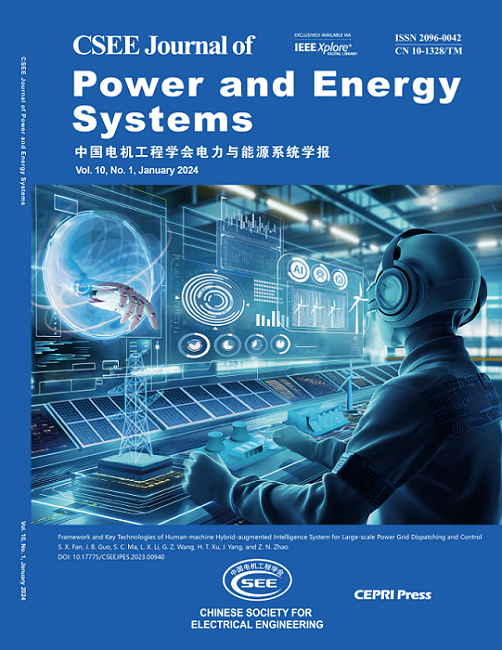Learning to Optimize Joint Chance-Constrained Power Dispatch Problems
IF 5.9
2区 工程技术
Q2 ENERGY & FUELS
引用次数: 0
Abstract
The ever-increasing integration of stochastic renewable energy sources into power systems operation is making the supply-demand balance more challenging. While joint chance-constrained methods are equipped to model these complexities and uncertainties, solving these problems using traditional iterative solvers is often time-consuming, limiting their suitability for real-time applications. To overcome the shortcomings of today's solvers, we propose a fast, scalable, and explainable machine learning-based optimization proxy. Our solution, called Learning to Optimize the Optimization of Joint Chance-Constrained Problems学习优化联合机会约束下的电力调度问题
随机可再生能源在电力系统运行中的集成日益增加,使得供需平衡更具挑战性。虽然联合机会约束方法可以模拟这些复杂性和不确定性,但使用传统的迭代求解器解决这些问题通常很耗时,限制了它们对实时应用的适用性。为了克服当今求解器的缺点,我们提出了一种快速、可扩展、可解释的基于机器学习的优化代理。我们的解决方案,称为学习优化联合机会约束问题的优化$(\mathcal{LOOP}-\mathcal{JCCP})$,是无迭代的,并且在一次射击中解决了潜在的问题。我们的模型使用原始问题的多面体重新表述来管理约束违规,并通过可定制的概率设置确保解决方案在各种情况下的可行性。为此,我们在最近的确定性解决方案$(\mathcal{LOOP}-\mathcal{LC}\ 2.0)$的基础上,结合一个集合聚合器模块来处理不同大小和复杂性的不确定样本集。我们的结果验证了我们的近最优解决方案在联合机会约束电力调度场景下的可行性。此外,我们的可行性保证了我们方法的透明度和可解释性,这对于操作员信任结果至关重要。结果表明,该模型在解决虚拟电厂的随机能量管理问题上是有效的。我们的理论分析在经验证据的支持下,揭示了参数调整的强大灵活性,对不同数据集的适应性,并显着提高了计算速度。
本文章由计算机程序翻译,如有差异,请以英文原文为准。
求助全文
约1分钟内获得全文
求助全文
来源期刊

CSEE Journal of Power and Energy Systems
Energy-Energy (all)
CiteScore
11.80
自引率
12.70%
发文量
389
审稿时长
26 weeks
期刊介绍:
The CSEE Journal of Power and Energy Systems (JPES) is an international bimonthly journal published by the Chinese Society for Electrical Engineering (CSEE) in collaboration with CEPRI (China Electric Power Research Institute) and IEEE (The Institute of Electrical and Electronics Engineers) Inc. Indexed by SCI, Scopus, INSPEC, CSAD (Chinese Science Abstracts Database), DOAJ, and ProQuest, it serves as a platform for reporting cutting-edge theories, methods, technologies, and applications shaping the development of power systems in energy transition. The journal offers authors an international platform to enhance the reach and impact of their contributions.
 求助内容:
求助内容: 应助结果提醒方式:
应助结果提醒方式:


